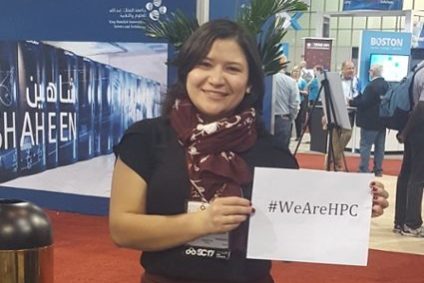How do honeybees lead to a career in HPC?
Guest post by: Alisa Alering, Science Node
First published on Science Node on 17th September 2019
Our Paths to HPC series, presented in collaboration with Women in HPC, showcases women working in high-performance computing. Our hope is that by highlighting these trailblazers—and the sometimes unique paths they followed into the field—other women will feel inspired to envision themselves in similar roles.
Today we talk with Gladys K. Andino, senior research analyst at Purdue University.
What was your path to working with HPC?
My path to HPC has been non-traditional. Long before college, I knew I wanted to pursue higher education. Once I got the chance, I decided to go for my doctorate.
During the first two years into the program I thought I had everything planned, I was working with honey bees and pathogens interactions… and even though it was so much work, I loved it and I was so excited. However, halfway into the program I was faced with the decision to have to change my research project and come up with a whole new idea for a project, or leave the program.
Short story, a lot of things were going wrong with my bees, and my research objective became very difficult to achieve so I had to change projects. Giving up my dream of achieving my degree was not an option. So, I welcomed and embraced a new project, still related to honeybees and mites. However, that new project required the use of bioinformatics tools, HPC resources, and programming skills—I had no experience with any of those.
Given my lack of expertise in bioinformatics and HPC at the time, I had to take programming courses, online tutorials, classes, and I reached out to every resource and person that could help me. Days after graduation, I was offered a position with the Research Computing team at Purdue. The group was looking for a person with my background in life sciences and with working knowledge of genomic data, bioinformatics tools, and an advanced user of HPC resources.
What do you like about working with HPC?
HPC is a tool that you can use in many areas of research. The way I see it, bioinformatics and HPC are a combo. I know I am biased, but I love what we can do with supercomputers and bioinformatics. I enjoy providing computing know-how to students, staff, and faculty with my expertise on bioinformatics software, analysis, and pipelines.
I get the opportunity to interact with researchers and students on a daily basis. I’m privileged to help them to make sense of their data at the same time that I get to learn more about their research—it is a win-win opportunity.
What are some of the challenges you have faced in following this path?
Coming from a non-traditional background has been one of the biggest challenges. I had no technical background when I got started, so I had to learn everything from scratch. However, I have to say I learn a lot from the error messages! Another challenge was that at the time that I was pursuing my degree there was a lack of mentors and community to reach out for help. Luckily for me, I eventually found a professor willing to teach me and be part of my advisory committee.
Any mentors or role models you would like to thank?
I would like to specially thank Professor Michael Gribskov from the Department of Biological sciences at Purdue. He has been a great mentor and a friend from the moment I knocked at his door for help. I would also like to thank Donna Cumberland, former executive director of Academic Computing at Purdue University. She has been a great role model and mentor. I admire her tenacity and boldness and professionalism. Last but not least, I would like to thank Preston Smith, director of Research Services and Support at Purdue. For believing in me and giving me the opportunity to join his team.
About the author: Alisa Alering, Managing Editor, Science Node

Originally trained as a librarian, Alisa loves tracking down the science behind her stories and learning something new about technology every day. With previous experience as a freelance writer and photo editor, she has held positions at Indiana University Press, PBS, and Google and earned degrees from Penn State and Indiana University. She particularly enjoys writing about women and diversity in technology, digital humanities, and the intersection of science and the natural world.
About Science Node

Science Node is an online magazine that connects the global research community, exploring how tech works and showing why it matters to our everyday lives. sciencenode.org

